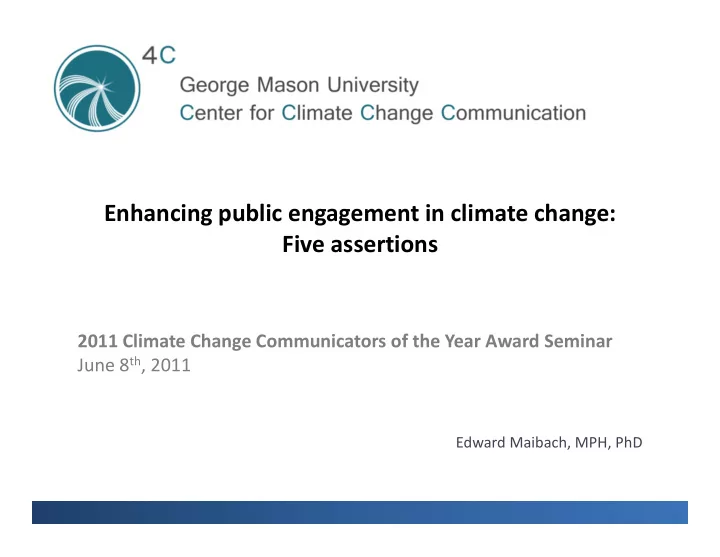

Enhancing public engagement in climate change: Five assertions 2011 Climate Change Communicators of the Year Award Seminar June 8 th , 2011 Edward Maibach, MPH, PhD
Public engagement – both process and outcome
Public engagement – the process
Public engagement – the process Providing people with trustworthy information on key policy issues, • eliciting their input, and integrating that input into decision ‐ making and social action. Three levels of public engagement process: • 1. Informing – a one ‐ way process in which government produces and delivers information for use by citizens. 1. Consulting – a two ‐ way process in which citizens' views are sought and citizens provide feedback to government. 1. Actively participating – a partnership in which citizens actively engage in the policy ‐ making process, playing a role in shaping the policy dialogue and potentially proposing policy options. Sources: Cohen et al (2008) BMC Public Health; OECD (2003)
Public engagement – the outcomes
Public engagement – the outcomes • Engagement is a state of personal connection with the issue. • Elements of personal engagement: 1. Cognitive – awareness; knowledge of critical facts; efficacy beliefs (self ‐ , political ‐ , and collective ‐ efficacy). 1. Affective – perceived relevance; concern; priority. 1. Behavioral – personal actions; social actions; societal actions. Sources: Lorenzoni et al (2007) Global Environmental Change; Ockwell et al (2009) Science Communication
Assertion #1 • With respect to science ‐ based perspectives about climate change, we don’t know nearly enough about: – effective public engagement processes – the most important public engagement outcomes. • The evidence for this assertion can be seen clearly in the shifts in public opinion over the past 1.5 decades.
Source: Dunlap & McCright, 2008, Environment
Assertion #2 • Two relatively small groups of Americans are strongly engaged in the issue of climate change, having reached completely opposite conclusions, but… • …the majority of Americas are only modestly engaged in the issue, if engaged at all.
Global Warming’s “Six Americas” Source: Yale & George Mason, 2008
Source: Yale & George Mason, 2008, 2010
Assertion #3 • Knowledge is helpful, but by no means is it sufficient to generate public engagement. – Most members of all Six Americas have little climate literacy. – An “information deficit” is not the core public engagement challenge.
Knowledge about Climate Change: Straight Scale Grades Leiserowitz et al ., (2010)
Is global warming happening? Anthony.Leiserowitz@yale.edu Source: Yale, July 2010 ( n = 2,030)
How much does burning fossil fuels contribute to global warming? Anthony.Leiserowitz@yale.edu Source: Yale, July 2010 ( n = 2,030)
How much does the hole in the ozone layer contribute to global warming? Anthony.Leiserowitz@yale.edu Source: Yale, July 2010 ( n = 2,030)
The “greenhouse effect” refers to: Anthony.Leiserowitz@yale.edu Source: Yale, July 2010 ( n = 2,030)
Assertion #4 “People simplify. Our job is to help them simply appropriately.” Source: Institute of Medicine (1989) Improving Risk Communication • “Simple clear messages, repeated often, by a variety of trusted sources” is a powerful formula for influencing the cognitive element of public engagement . – This formula is taken more seriously by opponents than proponents of climate action.
Global Warming Key Beliefs: • Belief certainty • Human causation • Collective efficacy *** • Harms timing *** • Harms extent • Policy Support Perceived Scientific n.s. Agreement • Injunctive Beliefs People who believe the myth that “there is a lot of disagreement among scientists about whether or not global warming is happening” are significantly less likely to hold key beliefs (especially certainty that global warming is happening) and to support societal action. Source: Ding D, Maibach E., Zhao X, Roser ‐ Renouf C, Leiserowitz A. (revise & resubmit). The misperception of scientific agreement on climate change: A myth that matters. Nature Climate Change
Assertion #5 • Trust is the currency through which public engagement is earned. – We tend to trust people and institutions that we feel we personally know (and who have demonstrated their trustworthiness to us) more than people and institutions who are distant to us.
How much do you trust or distrust the following as a source of information about global warming? 80 70 60 50 40 30 Somewhat 20 Strongly 10 0 May 2011, n=1,010 Source: Yale/George Mason
Jim Gandy, Senior Meteorologist, WLTX, Columbia, SC
Abstract Concrete Global Local
Schools should teach our children about global warming. Anthony.Leiserowitz@yale.edu Source: Yale, July 2010 ( n = 2,030)
http://climate.gmu.ed
Recommend
More recommend